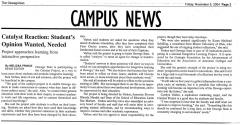|
|
The Institution Nestled on the shores of Lake Ontario, SUNY Oswego is a comprehensive public college with 143 years of history and tradition. About 8500 students are enrolled in its more than 100 undergraduate and graduate programs, many of which are nationally accredited. More than 300 full-time teacher-scholars interact with students in the classroom and in research and scholarly activities. Our campus provides students with several opportunities to for integrative learning. (Integrative Initiatives)
|
|
|
|
The Project Oswego's integrative learning initiative, known as the Catalyst Project asks students to reflect on their learning: how they have used their knowledge and skills, whether they perceive coherence in their academic experiences, and how they have been changed by their education. (Catalyst Project).
|
|

Students are excited about Catalyst Project |
Products We shared our ideas and findings in several forums, both on and off our campus. We have presented this work at national conferences, for other faculty on our own campus and for our colleagues participating in the integrative learning project. (Presentation Details)
|
|
|
|
Reflections & New Directions The reflections gathered by the Catalyst Project indicate that many first-year students have had significant integrative experiences in high school, and that their academic and personal transition to college does not always build on these experiences. Through analysis of students' description of integrative assignments, we have identified characteristics of assignments that promote integration and we are piloting an integrative "first-year project" in several First Choice courses. Of particular interest is the way in which the social dimension of learning--adopting others' perspective, oral presentation--is in many students' experiences crucial to integrative processes. Similarly, focus groups conducted with juniors and seniors in Intellectual Issues courses show that the structure and format of these courses could more effectively promote interdisciplinary inquiry. This information will be used as part of the assessment and refinement of these General Education courses. Finally, by involving faculty and staff in the analysis of student reflections, we have advanced a campus-wide conversation about learning; we expect that this ongoing activity will strengthen integrative teaching and learning at SUNY at Oswego.
|
|
|